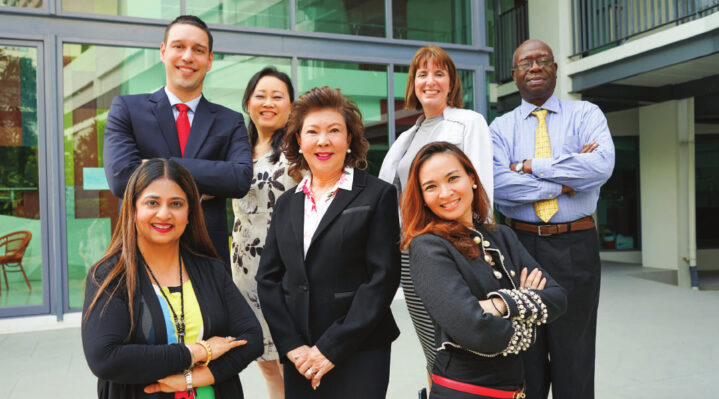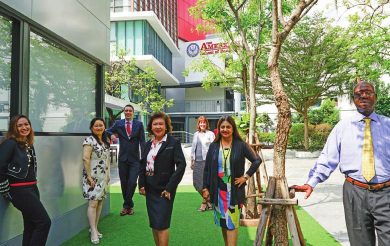
Mindfulness in Educational Leadership
Educational leaders are faced with daily complex problems that do not have simple answers and coping with the demands of students, parents and teachers is sometimes stressful. Despite these challenges, leaders can learn to be successful and promote student growth in a nurturing school community through implementing a mindfulness initiative across the school.
At the American School of Bangkok (ASB), mindfulness is deeply embedded within the school’s philosophy and the results have been far reaching and profound. Administrators who had been feeling tired, anxious, and overworked from endless demands have found a happy and healthy path through practicing skilful mindful leadership.
The goal of mindful leadership at ASB is to develop a nonjudgmental focus that embraces compassion, clarity and an understanding of service to others. Through practicing mindful breathing and relaxation, ASB leaders reduce stress levels and develop a sense of internal wellbeing. This has enabled them to reduce absenteeism, significantly increase job satisfaction and improve staff relationships.
By improving themselves through mindful practice, school leaders have been able to focus the majority of their attention on the academic, behavioural, mindful development of ASB students.
There is extensive neurological and educational research that shows mindfulness helps students improve their behaviour, emotional balance, and academics. Mindfulness has become a proven tool for helping students become the next generation of successful leaders in the global community.
Although mindfulness can be interpreted by each individual differently, it can be summed up on a very basic level as “skilful attention”, or simply paying attention to what is happening in the moment. By being engaged with one’s thoughts, feelings and body, and individual becomes “consciously conscience”. ASB’s goal of seeing graduates who are well-rounded individuals with empathy, resilience, and excellent life skills was set by all stakeholders. As a result, graduates who are prepared for college with with sound academic knowledge, are able to enter the world with an invigorating and insightful view of the world around them.
ASB has found the best tool in mindful leadership is to simply listen to what students and parents have to say. Paying attention to their needs and delivering on what they want is always a priority. So where parents rely on the school for answers to help their child’s behaviour and academics improve, the leadership knows the appropriate steps to take. ASB never stops believing in its children and whether a child blossoms early or is in need of more time to fulfil their potential, mindfulness is the key to ASB’s patience and understanding.

One of the hallmarks of ASB’s leadership is that all members are are comfortable with each other as a team. It takes time to build a trust, and before respect is given, members have to show their commitment to one another and ASB’s mindful cause. The team proudly supports one another in both good and difficult times, and understands each other as individuals.
As teachers, staff, and students see the unity of the team leadership, it introduces new ideas and tightens working relationships to strengthen the school’s community. As a result, ASB’s employees are happy and proud to come to work everyday.
Leaders of course know the main goal of education is high academic achievement. However our leaders also know the practical benefits of mindfulness and how that helps our students increase in these areas by increasing their own ability to concentrate deeper and for longer periods of time. To maintain a calm mind when taking an examination and other possible stressful situations. Learning to “respond instead of react” when talking to peers and other people by taking a small pause between stimuli and their response.
With heightened academic pressure for students of all ages, increased social media distractions and the peer pressure students feel. Children today are faced with an unprecedented amount of stress and anxiety. Many surveys today, of children of all school ages, show students are dealing with extreme fatigue, negative emotions and stress up to 75% of the time.
Incorporating mindfulness into education has been linked to improving academic achievements, increased social and emotional learning as well our helping students become more compassionate and empathetic towards others. Mindfulness also strengthens some underlying development processes, increases neural activity and brain functions in areas such as focus, concentration, resilience, and self-soothing – that will help kids in the long run.”
For every action there is a reaction, however, learning to take a short pause, something as simple as a deep breath, can help make that reaction be something that comes from an empathetic and compassionate point of view.In conclusion, mindfulness in leadership is never easy to do. One has to combat his or her emotions and to be the best self most of the time. You have to learn to conquer fear and be calm during crisis management. Know how to respond with composure while the other party may well be screaming.
If there was one thing that made us stronger, it is the fact that our leading staff members have seen most scenarios one might encounter as a leader in education and by studying, practicing and applying mindfulness in their daily lives they are equipped to to face each day with a positive, compassionate and empathetic perspective.



